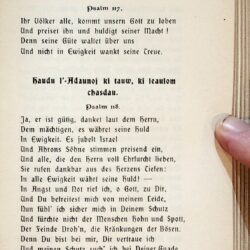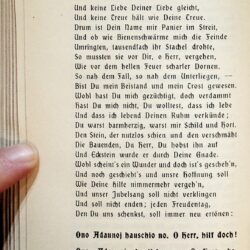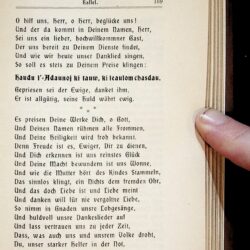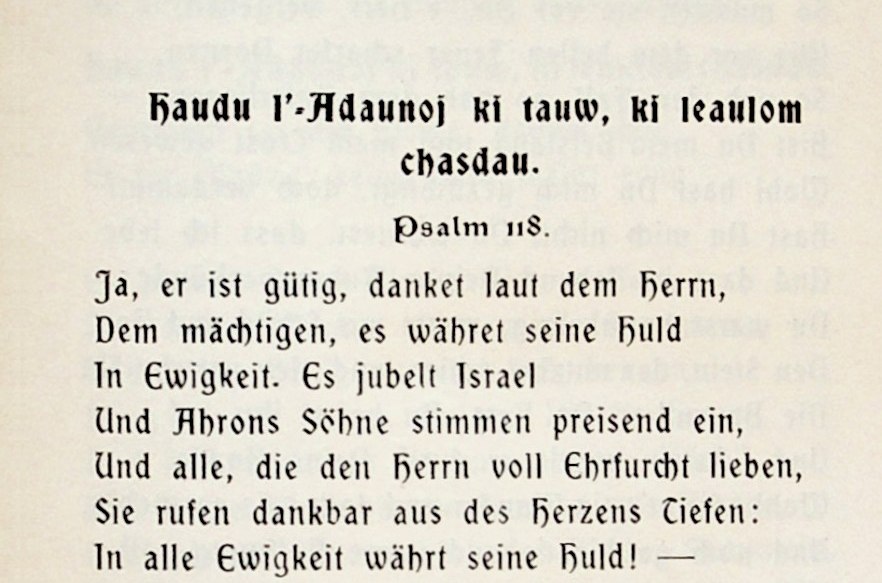| Source (Hebrew) | Adaptation (German) | Translation of German (English) |
|---|---|---|
|
הוֹדוּ לַיהֹוָה כִּי־טוֹב
כִּי לְעוֹלָם חַסְדּוֹ׃ יֹאמַר־נָא יִשְׂרָאֵל כִּי לְעוֹלָם חַסְדּוֹ׃ יֹאמְרוּ־נָא בֵית־אַהֲרֹן כִּי לְעוֹלָם חַסְדּוֹ׃ יֹאמְרוּ־נָא יִרְאֵי יְהֹוָה כִּי לְעוֹלָם חַסְדּוֹ׃ |
Haudu l’⸗Adaunoj ki tauw ki leaulom chasdau.
Ja, er ist gütig, danket laut dem Herrn, Dem mächtigen, es währet seine Huld In Ewigkeit. Es jubelt Israel Und Ahrons Söhne stimmen preisend ein, Und alle, die den Herrn voll Ehrfurcht lieben, Sie rufen dankbar aus des Herzens Tiefen: In alle Ewigkeit währt seine Huld! — |
Hodu lAdonai ki tov, ki l’olam ḥasdo.
Yes, he is gracious, give thanks aloud to the Lord, the mighty one, his favor lasts forever. Israel rejoices And Aharon’s sons join in with praise, And all who love the Lord with reverence, They cry out gratefully from the depths of their hearts: His favor endures forever! — |
|
מִן־הַמֵּצַר קָרָאתִי יָּהּ
עָנָנִי בַמֶּרְחָב יָהּ׃ יְהֹוָה לִי לֹא אִירָא מַה־יַּעֲשֶׂה לִי אָדָם׃ יְהֹוָה לִי בְּעֹזְרָי וַאֲנִי אֶרְאֶה בְשֹׂנְאָי׃ |
In Angst und Not rief ich, o Gott, zu Dir,
Und Du befreitest mich von meinem Leide, Nun fühl’ ich sicher mich in Deinem Schutz Und fürchte nicht der Menschen Hohn und Spott, Der Feinde Drob’n, die Kränkungen der Bösen. Denn Du bist bei mir, Dir vertraue ich Und meinen Schutz such’ ich bei Deiner Gnade. |
In fear and distress I cried out to You, O God,
and You delivered me from my suffering, Now I feel safe in Your protection and do not fear the scorn and mockery of men, the threats of enemies, the insults of the wicked. For You are with me, in You I trust And I seek my protection in Your grace. |
|
טוֹב לַחֲסוֹת בַּיהֹוָה
מִבְּטֹחַ בָּאָדָם׃ טוֹב לַחֲסוֹת בַּיהֹוָה מִבְּטֹחַ בִּנְדִיבִים׃ |
Nicht Fürstengunst und nicht der Mächt’gen Schwert
Sind Deiner Gunst und Macht je zu vergleichen, Und keine Liebe Deiner Liebe gleicht, Und keine Treue hält wie Deine Treue. |
No prince’s favor and no mighty sword
can ever compare to Your favor and power, and no love is like Your love, and no loyalty endures like Your loyalty. |
|
כׇּל־גּוֹיִם סְבָבוּנִי
בְּשֵׁם יְהֹוָה כִּי אֲמִילַם׃ סַבּוּנִי גַם־סְבָבוּנִי בְּשֵׁם יְהֹוָה כִּי אֲמִילַם׃ סַבּוּנִי כִדְבוֹרִים דֹּעֲכוּ כְּאֵשׁ קוֹצִים בְּשֵׁם יְהֹוָה כִּי אֲמִילַם׃ |
Drum ist Dein Name mir Panier im Streit,
Und ob wie Bienenschwärme mich die Feinde Umringten, tausendfach ihr Stachel drohte, So mussten sie vor Dir, o herr, vergehen, Wie vor dem hellen Feuer scharfer Dornen. |
That is why Your name is my standard in battle,
and even if the enemies surrounded me like swarms of bees, their sting threatening a thousand times, they had to perish before You, O Lord, as before the brilliant fire of sharp thorns. |
|
דַּחֹה דְחִיתַנִי לִנְפֹּל
וַיהֹוָה עֲזָרָנִי׃ עׇזִּי וְזִמְרָת יָהּ וַיְהִי־לִי לִישׁוּעָה׃ קוֹל רִנָּה וִישׁוּעָה בְּאׇהֳלֵי צַדִּיקִים יְמִין יְהֹוָה עֹשָׂה חָיִל׃ יְמִין יְהֹוָה רוֹמֵמָה יְמִין יְהֹוָה עֹשָׂה חָיִל׃ לֹא־אָמוּת כִּי־אֶחְיֶה וַאֲסַפֵּר מַעֲשֵׂי יָהּ׃ |
So nah dem Fall, so nah dem Unterliegen, —
Bist Du mein Beistand und mein Trost gewesen. |
So close to falling, so close to succumbing, —
You were my support and my comfort. |
|
יַסֹּר יִסְּרַנִּי יָּהּ וְלַמָּוֶת לֹא נְתָנָנִי׃
פִּתְחוּ־לִי שַׁעֲרֵי־צֶדֶק אָבֹא־בָם אוֹדֶה יָהּ׃ זֶה־הַשַּׁעַר לַיהֹוָה צַדִּיקִים יָבֹאוּ בוֹ׃ אוֹדְךָ כִּי עֲנִיתָנִי וַתְּהִי־לִי לִישׁוּעָה׃ |
Wohl hast Du mich gezüchtigt, doch verdammt
Hast Du mich nicht, Du wolltest, dass ich lebe Und dass ich lebend Deinen Ruhm verkünde; Du warst barmherzig, warst mir Schild und Hort. |
You chastised me, but you did not condemn me,
you wanted me to live and to proclaim your glory alive; you were merciful, you were my shield and refuge. |
|
אֶבֶן מָאֲסוּ
הַבּוֹנִים הָיְתָה לְרֹאשׁ פִּנָּה׃ |
Den Stein, der nutzlos schien und den verschmäht
Die Bauenden, Du Herr, Du hobst ihn auf Und Eckstein wurde er durch Deine Gnade. |
The stone that seemed useless and was spurned
by the builders, You Lord, lifted it up and by Your grace it became the cornerstone. |
|
מֵאֵת יְהֹוָה הָיְתָה זֹּאת
הִיא נִפְלָאת בְּעֵינֵינוּ׃ זֶה־הַיּוֹם עָשָׂה יְהֹוָה נָגִילָה וְנִשְׂמְחָה בוֹ׃ אָנָּא יְהֹוָה הוֹשִׁיעָה נָּא אָנָּא יְהֹוָה הַצְלִיחָה נָּא׃ |
Wohl scheint’s ein Wunder und doch ist’s gescheh’n,
Und noch geschieht’s und unsre Hoffnung soll Wie Deine Hilfe nimmermehr vergeh’n, Und unser Jubelsang soll nicht verklingen Und soll nicht enden; jeden Freudentag, Den Du uns schenkst, soll immer neu ertönen: Ono Adaunoj hauschio no. O herr, hilf doch! Ono Adaunoj hazlicho no. O herr, beglücke doch! |
It seems like a miracle and yet it has happened,
and it is still happening and our hope shall never fade away like your help, and our song of rejoicing shall not fade away and shall not end; every day of joy, which you give us, shall always resound anew: Ana Adonai hoshi’ah na. O Lord, help us! Ana Adonai hatslikhah na. O Lord, make us happy! |
|
בָּרוּךְ הַבָּא בְּשֵׁם יְהֹוָה בֵּרַכְנוּכֶם מִבֵּית יְהֹוָה׃ אֵל יְהֹוָה וַיָּאֶר לָנוּ אִסְרוּ־חַג בַּעֲבֹתִים עַד־קַרְנוֹת הַמִּזְבֵּחַ׃ אֵלִי אַתָּה וְאוֹדֶךָּ אֱלֹהַי אֲרוֹמְמֶךָּ׃ |
O hilf uns, Herr, o Herr, beglücke uns!
Und der da kommt in Deinem Namen, Herr, Sei uns ein lieber, hochwillkommner Gast, Der uns bereit zu Deinem Dienste findet, Und wie wir heute unser Danklied singen, So soll es stets zu Deinem Preise klingen: |
O help us, Lord, O Lord, make us happy!
And he who comes in your name, Lord, Be a dear, most welcome guest to us, Who finds us ready for your service, And as we sing our song of thanksgiving today, So may it always ring out in your praise: |
|
הוֹדוּ לַיהֹוָה כִּי־טוֹב כִּי לְעוֹלָם חַסְדּוֹ׃
|
Haudu l’⸗Adaunoj ki tauw, ki leaulom chasdau.
Gepriesen sei der Ewige, danket ihm, Er ist allgütig, seine Huld währt ewig. |
Hodu lAdonai ki tov, ki l’olam ḥasdo.
Praise be to the Eternal, give thanks to him, He is all-good, his grace endures forever. |
This adapted translation of Psalms 118 by Lisa Tarlau can be found in Rabbi Max Grunwald’s anthology of Jewish women’s prayer, Beruria: Gebet- und Andachtsbuch für jüdische Frauen und Mädchen (second revised edition 1909), pages 167-169.
The transcription of the German provided machine-readable text for machine translations by DeepL, which we then edited for accuracy and clarity. We welcome any/all corrections, improvements, and additional transcriptions and translations of this work’s contents. –Aharon Varady
Source(s)






